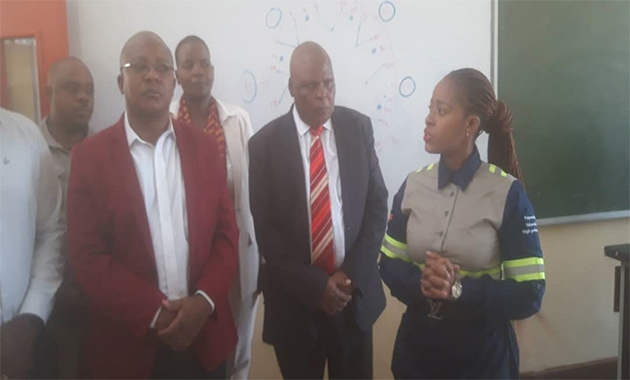Sadc reaffirms anti-sanctions solidarity
Chronicle Reporters
SADC yesterday said the illegal sanctions on Zimbabwe are constraining national economic recovery, human security and sustainable growth thus should be immediately and unconditionally removed.
Sadc Heads of State in 2019 set October 25 as the region’s anti-sanctions day as they said the effects of the illegal embargo is spilling into their nations.
President Mnangagwa is today set to lead the anti-sanctions agenda and his message will be broadcast on various platforms while regional solidarity messages will also be made.
The country has been under illegal sanctions for two decades affecting various sectors of the economy while hurting ordinary citizens.
As a result of the punitive measures, some Zimbabweans have emigrated in pursuit of new economic opportunities, contributing to some families disintegrating.
The illegal Western sanctions were imposed on the country as a punishment for embarking on the land reform programme, whose aim was to address colonial imbalances where prime land was only in the hands of few whites while the black majority remained landless.
Since the coming into power of the Second Republic in November 2017, it has embarked on a re-engagement drive with the international community but the West has maintained the embargo.
In a statement to mark Sadc Anti-sanctions Solidarity Day, Sadc Chairperson and Malawi President Lazarus
Chakwera said the regional bloc stands firm in solidarity with the Government and Zimbabweans in calling for the removal of the illegal sanctions. He said the measures have had devastating effects on the lives of Zimbabweans.
“As SADC, we are concerned by the continuation of sanctions on some individuals or entities of Zimbabwe and hereby call for the unconditional and immediate lifting of these sanctions. There is no doubt that this lifting will facilitate socio-economic recovery, and enable Zimbabwe to meet her national and regional economic development plans as well as effectively manage her international obligations,” he said.
“As a region, we remain adamant that the sanctions imposed on Zimbabwe, whether targeted or restrictive, are a fundamental constraint and hindrance to the country’s prospects of economic recovery, human security and sustainable growth. The global impact of the Covid-19 pandemic, coupled with the recent devastating cyclones Chalane (December 2020) and Eloise (February 2021) have mounted added socio-economic pressures that continue to impact negatively on the lives and livelihoods of the people of Zimbabwe.”
President Chakwera said the illegal sanctions have seen the country failing to attract foreign direct investment (FDI) which is key in global re-building of economies.
“FDI, by virtue of being the largest source of foreign capital, remains a critical catalyst and facilitator of growth. The sanctions increase the perception of Zimbabwe as being in a high-risk profile category, thereby diminishing the credibility of investment and investor confidence, while exacerbating investment risks,” said President Chakwera.
“This further diminishes the country’s prospects of obtaining impactful FDI and serves as a deterrent for economic emancipation, growth and stability.”
He commended international development partners who despite sanctions have stood with Zimbabwe in its quest to develop.
President Chakwera said the region will continue to constructively engage in dialogue.
“The Republic of Zimbabwe, and the Sadc region, are committed to engage in meaningful and constructive dialogue with all relevant stakeholders, with a view to consolidate the rule of law, democracy, governance and human rights. It is only through such exchanges that better appreciation of the concerns of all parties could be secured and progress towards their resolution be achieved,” said President Chakwera.
“Consistent with the collective global commitment ‘to leave no one behind’ and in practical furtherance of the spirit of multilateralism, Sadc calls for the immediate and unconditional removal of all sanctions imposed on Zimbabwe, for the good of the country and its people, the Sadc region and the global community.”
Speaking to journalists on the sidelines of the ongoing pre-budget seminar in Victoria Falls, Information, Publicity and Broadcasting Services Minister Monica Mutsvangwa said there is a change of rhetoric especially in the opposition parties who now admit sanctions are hurting the country.
She said Zimbabwe is not campaigning against sanctions to create enmity with any nation.
“We used to hear from opposition but the language has changed. Everyone has seen it; you go through schools you see infrastructure. If you have been attending Parliament you will be impressed because the opposition are the ones who are actually saying sanctions are terrible.
“Sanctions also fuel corruption because money doesn’t come through the banks, for instance when Zimbabwe is selling its products whether its minerals, the money doesn’t come directly but goes through third parties and that fuels corruption. We want everybody to benefit,” she said yesterday.
She said the Second Republic had demonstrated that it can drive the nation using local resources.
“Sanctions have made it difficult to get equipment to the country and everybody is affected in tourism and airlines cannot get spare parts, banks can’t deal with correspondent banks while foreign accounts are closed.
“It has been very difficult for Zimbabweans to do business as educated as we are but we have done well as a country.
People can’t have visa cards to go on the economic global cycle. These sanctions are not benefitting anyone. So, we are saying yes it has caused a lot of pain, a lot of brain drain as we have so many Zimbabweans in the diaspora but a lot has been done and we have demonstrated to the world that Zimbabwe is capable, has got a lot of resources and expertise,” said Minister Mutsvangwa.
She commended Sadc Heads of State for designating October 25 as the day to call for removal of sanctions.
She said the sanctions are illegal because they didn’t go through the United Nations.
“This is the Western former colonisers who introduced sanctions so that they strangle this Government so that we don’t prosper economically. A lot of companies closed and machinery broke down. The President has said we need to think seriously about who we are hence we want sanctions to be removed because they are affecting the poorest of the people,” she said.
Foreign Affairs and International Trade Minister, Ambassador Frederick Shava said his office had noted thawing relations between Zimbabwe and the European Union.
“As Foreign Affairs we have invested focus on re-integration as we continue campaigning against sanctions. We have seen the EU melting towards Zimbabwe and there is keenness to establish relations,” said Ambassador Shava.
The Political Actors Dialogue (Polad) yesterday also added its voice in calling for the removal of the punitive measures.
Polad economic committee chairman, Mr Trust Chikohora, also a past president of the Zimbabwe National Chamber of Commerce said: “They (sanctions) are hurting the economy. Zimbabwe is not able to access balance of payments support from IMF and development support from the World Bank.”
He said as a result of the illegal sanctions it was also difficult for the country to access funding from other international financial institutions.
This, he said, was on account that other financial institutions use multilateral institutions as points of reference in terms of risk profiling.
“If we access any funding it will be at a huge premium because of the country risk factor brought about by sanctions,” said Mr Chikohora.
“Foreign Direct Investment and trade is also curtailed by the country’s risk factor.
“Big multinationals from those countries are discouraged from investing in Zimbabwe as this would be seen as going against their own countries’ foreign policy.”
He said some payments to Zimbabwean companies or individuals’ payments have been intercepted in the past and some banks have been fined huge amounts for processing Zimbabwe payments.
“This is wrong and it affects the person on the ground and affects our capacity to improve social services such as transport, health, education, electricity, water and other infrastructure, which affects our socio-economic development and quality of life,” said Mr Chikohora.
“Zimbabwe deserves to be treated like any other country in the world so that we can freely develop our country for the benefit of the people.”












Comments